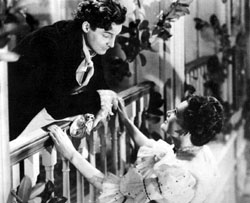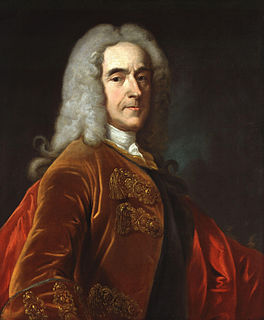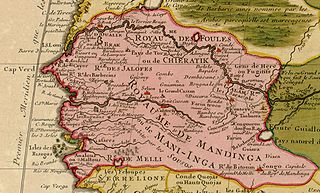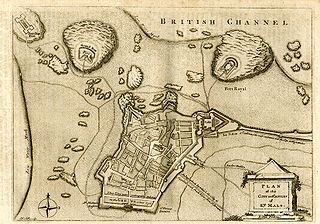
William Pitt, 1st Earl of Chatham, was a British statesman of the Whig group who served as Prime Minister of Great Britain from 1766 to 1768. Historians call him Chatham or William Pitt the Elder to distinguish him from his son, William Pitt the Younger, who was also a prime minister. Pitt was also known as the Great Commoner, because of his long-standing refusal to accept a title until 1766.

George Grenville was a British Whig statesman who rose to the position of Prime Minister of Great Britain. Grenville was born into an influential political family and first entered Parliament in 1741 as an MP for Buckingham. He emerged as one of Cobham's Cubs, a group of young members of Parliament associated with Lord Cobham.

Frederick North, 2nd Earl of Guilford, better known by his courtesy title Lord North, which he used from 1752 to 1790, was Prime Minister of Great Britain from 1770 to 1782. He led Great Britain through most of the American War of Independence. He also held a number of other cabinet posts, including Home Secretary and Chancellor of the Exchequer.

William Petty Fitzmaurice, 1st Marquess of Lansdowne,, was an Irish-born British Whig statesman who was the first home secretary in 1782 and then prime minister from 1782 to 1783 during the final months of the American War of Independence. He succeeded in securing peace with America and this feat remains his most notable legacy.

General John Pitt, 2nd Earl of Chatham, also 2nd Viscount Pitt and 2nd Baron Chatham, was a British soldier and politician. He spent a lengthy period in the cabinet but is best known for commanding the disastrous Walcheren Campaign of 1809.

The Battle of Minorca was a naval battle between French and British fleets. It was the opening sea battle of the Seven Years' War in the European theatre. Shortly after the war began British and French squadrons met off the Mediterranean island of Minorca. The French won the battle. The subsequent decision by the British to withdraw to Gibraltar handed France a strategic victory and led directly to the Fall of Minorca.
The 1768 British general election returned members to serve in the House of Commons of the 13th Parliament of Great Britain to be held, after the merger of the Parliament of England and the Parliament of Scotland in 1707.

The Young Mr. Pitt is a 1942 British biographical film of the life of William Pitt the Younger and in particular his struggle against revolutionary France and Napoleon. It was directed by Carol Reed and stars Robert Donat, Robert Morley, Phyllis Calvert and John Mills. Made in black-and-white, it was produced by Edward Black and Maurice Ostrer for the British subsidiary of 20th Century Fox.

The Raid on Cherbourg took place in August 1758 during the Seven Years' War when a British force was landed on the coast of France by the Royal Navy with the intention of attacking the town of Cherbourg as part of the British government's policy of "descents" on the French coasts.

Great Britain was one of the major participants in the Seven Years' War, which in fact lasted nine years, between 1754 and 1763. British involvement in the conflict began in 1754 in what became known as the French and Indian War. However the warfare in the European theater involving countries other than Britain and France commenced in 1756. Britain emerged from the war as the world's leading colonial power, having gained all of New France in North America, ending France's role as a colonial power there. Following Spain's entry in the war in alliance with France in the third Family Compact, Britain captured the major Spanish ports of Havana, Cuba and Manila, in the Philippines in 1762, and agreed to return them in exchange for Florida, previously controlled by Spain. The Treaty of Paris in 1763 formally ended the conflict and Britain established itself as the world's pre-eminent naval power.

Between 1757 and 1762, at the height of the Seven Years' War, the Pitt–Newcastle ministry governed the Kingdom of Great Britain. It was headed by Thomas Pelham-Holles, 1st Duke of Newcastle, serving in his second stint as prime minister. The most influential and famous minister however was William Pitt the Elder, Secretary of State.

The Cobhamite faction were an 18th-century British political faction built around Richard Temple, 1st Viscount Cobham and his supporters. Among its members, the group included the future Prime Ministers William Pitt and George Grenville. They had a general Whig philosophy and were at first supporters of Prime Minister Sir Robert Walpole but later became opponents of his administration.

The siege of Almeida took place in August 1762 when a Spanish force besieged and captured the city of Almeida from its Portuguese defenders during the Seven Years' War. The city was taken on 25 August as part of the invasion of Portugal by a Spanish army commanded by the Count of Aranda.

The capture of Senegal took place in 1758 during the Seven Years' War with France, as part of a concerted British strategy to weaken the French economy by damaging her international trade. To this end, a succession of small British military expeditions landed in Senegal and captured Gorée and Fort Saint Louis, the French slave fort located at Saint-Louis, seizing French vessels and supplies. By late 1758 the whole of the French colony on the Senegalese coast had been captured by the British, with administrative matters being handled by the first British Governor of Senegal, Lieutenant Colonel Richard Worge.

The Capture of Gorée occurred in December 1758 when a British naval expedition led by Augustus Keppel against the French island of Gorée off the coast of Senegal during the Seven Years' War.

The Capture of Belle Île was a British amphibious expedition to capture the French island of Belle Île off the Brittany coast in 1761, during the Seven Years' War. After an initial British attack was repulsed, a second attempt under General Studholme Hodgson forced a beachhead. A second landing was made, and after a six-week siege the island's main citadel at Le Palais was stormed, consolidating British control of the island. A French relief effort from the nearby mainland was unable to succeed because of British control of the sea. The British occupied the island for two years before returning it in 1763 following the Treaty of Paris.

The Raid on St Malo took place in June 1758 when an amphibious British naval expedition landed close to the French port of St Malo in Brittany. While the town itself was not attacked, as had been initially planned, the British destroyed large amounts of shipping before re-embarking a week later. The naval forces were under the command of Richard Howe while the army was led by the Duke of Marlborough and Lord Sackville.

The Chatham ministry was a British government led by William Pitt, 1st Earl of Chatham that ruled between 1766 and 1768. Because of Pitt's former prominence before his title, it is sometimes referred to as the Pitt ministry. Unusually for a politician considered to be Prime Minister, Pitt was not First Lord of the Treasury during the administration, but instead held the post of Lord Privy Seal.

The Death of the Earl of Chatham is the title of a 1781 oil-on-canvas painting by Boston-born American artist John Singleton Copley. It depicts the collapse of William Pitt, 1st Earl of Chatham on 7 April 1778, during a debate in the House of Lords on the American War of Independence. Chatham is surrounded by peers of the realm, and the painting contains fifty-five portraits.
Premiership of William Pitt may refer to:


















